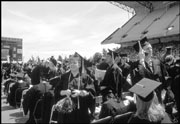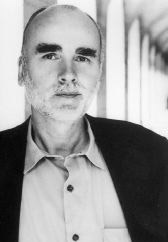ON SATURDAY, June 9, the University of Washington will celebrate its 126th commencement, capping a year in which more than 10,000 of its students will have earned academic degrees. Departing right along with the Class of 2001 are unusually large numbers of humanities professors headed for better jobs elsewhere. It’s a trend that has accelerated in recent years, evoking serious concern from deans and department chairs, and intensifying an administrative push to restructure university finances.
These things are happening quietly, without the kind of public discussion among Washington state citizens that should be taking place when their flagship university—still one of the great American public universities, despite a disturbing faculty exodus—is on the brink of radical change.
In the last two years, the 62-member English department lost 12 professors, many of them outstanding teachers. “It’s an enormous number,” department Chair Shawn Wong says, “and a significant worry.”
So far, the UW’s English department still ranks among the best, according to national polls. “It’s famous,” remarks Wong, “especially in creative writing—we’re in the top 10—and in American Studies. We’ve held our own.” But retention is increasingly a problem.”Our salaries aren’t competitive, even setting aside those of privately endowed institutions such as Duke and Yale,” Wong explains. “Now some of our finest people are leaving for public universities like Michigan and Illinois. At our eight peer universities, the average salary is higher than 90 percent of all the salaries in this department. Thirty-five of my English colleagues earn less than kindergarten teachers with comparable experience. Our [state] Legislature really needs to get the message that we cannot continue giving professors minimal [salary] increases and expect to compete in the marketplace.”
English Professor and former Divisional Dean of Humanities Richard Dunn recites a mournful litany of attrition in Classics, Asian languages and lit, Scandinavian folklore, Germanics, Chinese art history—”We’ve lost prestigious, brilliant people, just when we have this wonderful new [Simpson] Humanities Center and wonderful gifts coming in to support it.” Beyond the sheer size of the exodus, said Dunn, “What concerns me is the loss of academic leadership and distinction. It’s quite devastating.”
History Chair Robert Stacey agreed: “Humanities across the board is in grave danger.” Since losing star historian Richard White two years ago, Stacey’s department has been able to extend adequate counteroffers to members who got big bids from other universities, but he worries about setbacks elsewhere on campus: “How well can the UW do the basic job of teaching the humanities?”
UW salaries were never high, but the gap between incomes inside and outside it has widened—many young graduates enter the job world at salaries far greater than those of the professors who taught them. The UW can no longer count on “the Rainier factor”—the attractions of Pacific Northwest living—to compensate for low incomes when Seattle has become so expensive that faculty have a hard time buying homes. History Professor James Gregory says, “Over the past eight years, considering increases in the cost of living, most faculty salaries have declined.”
BUT THE PUBLIC seems unaware of the consequent flight of key people. As Vice-Provost for Planning and Budgeting Harlan Patterson observed, “This is less obvious than lower scores on the WASL, Boeing’s departure, or traffic congestion. It takes a long time to notice first-rate teachers leaving, until too many have left—until it’s like waking up one morning to find Mount Rainier gone.”
Washington’s Legislature can’t seem to make funding decisions that will ease the situation, even in prosperous times, partly because citizens have hamstrung the state with initiatives. “But if the state is paralyzed,” comments Stacey, “the UW can’t sit here paralyzed, too. We’ll go under.”
According to Stacey, President Richard McCormick “has been trying to get the Legislature and state citizens to focus on the big issues: What do they expect from the UW, and what kind of university do they want to support?” But it’s hard to get the discussion going, even with business leaders. “Too many companies have an essentially colonial attitude toward this state,” Stacey says. “They want low taxes and a favorable business climate and some necessary tech workers graduating from the UW, but they’ll send their own children to private schools and out-of-state colleges. They don’t need to support a Berkeley-quality campus—they can let California taxpayers pay to produce Berkeley grads and then hire them.”
In any case, says Stacey, in lobbying the Legislature the UW “has dropped what [Provost] Lee [Huntsman] calls the ‘boast and whine’ approach—’Look how good we are, and why don’t you support us?’ Now we say, ‘Here’s what we’d like to do. If you want us to do these things, here’s what it will cost. If you don’t fund them, we won’t do them.’ It’s more straightforward, but it doesn’t produce a statewide conversation about what the people really want from their University of Washington.”
Future conversations will more likely be about what the wealthy people want. To survive, the UW may have to increase its dependency on donations from more generous pockets than the Legislature’s. The state contributed only 16 percent of the most recent overall UW budget, so already Washington residents can hardly boast of having a state-supported world-class university. According to Dean of Arts and Sciences David Hodge, “Even in the College of Arts and Sciences, where we do the heavy lifting in teaching, only 40 percent is currently covered by state funding. This is a watershed year in the university for explicitly recognizing [inadequate state funding as a pattern] and beginning to develop realistic [financial] pathways.” Michael Halleran, divisional dean for Arts and Humanities, agrees: The UW must solve “structural problems in how we support ourselves. In 2011, if we are successful, it will be in no small measure because we devised alternative funding systems.”
One idea under serious discussion is to develop a three-pronged financial structure resembling those of peer universities U. Michigan and U. Penn. This would consist of lower state funding, higher tuition, and contributions from grants, contracts, and philanthropic sources (see “Funding Education” via www.washington.edu/home/search.html). Though the concept of a tripartite financing approach is “not new,” Halleran says, “it’s been more vigorously discussed in the last 6 months.” If this plan goes forward, the traditionally low-cost UW will raise tuition, spend lots of it to support a huge financial aid system, and become more vulnerable to the promptings of corporate interests and millionaires. The fundamental nature of the university will be changed forever. But, as Halleran points out, “A state will get the public universities it deserves.”
Judy Lightfoot has held temporary faculty appointments in the UW English Department where her husband, Robert McNamara, is a lecturer.








